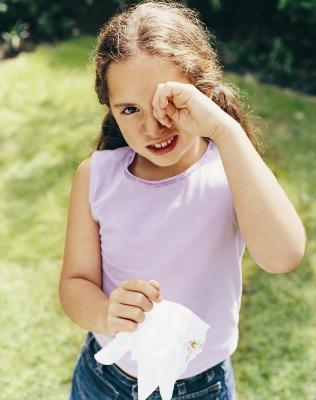When a kid has symptoms such as sneezing, headache, dizziness, hoarseness or a cough, it can be difficult to know if they’re symptoms of the common cold or an allergy. The difference is that colds are the direct result of a virus, whereas allergies are a defense mechanism developed by the body to protect against allergens such as dust, dander and pollen. While diagnosis is best made by a physician, being able to tell the difference between a simple cold and a full-blown allergy can help you play a proactive role in helping to relieve your child’s symptoms.
Step 1
Check your child for a fever using a thermometer. In children, a fever is a temperature above 99.5 degrees Fahrenheit when taken orally or above 100.4 degrees Fahrenheit when taken rectally, according to Family Doctor.org. If your child has a fever, chances are he doesn’t have an allergy. Fevers are not associated with allergies, but they do run hand-in-hand with colds.
Step 2
Look for signs of aches and pains in your child. Aches and pains in your child’s muscles that occur with movements are never associated with allergy symptoms. However, according to the BMJ Group, such symptoms do have a close association with the common cold.
Step 3
Examine your child’s nose for discharge. While nasal discharge is a symptom of both an allergy and a cold, the nasal discharge associated with an allergy tends to remain clear for as long as the child is symptomatic. On the other hand, if you notice that the clear discharge turns to a creamy yellow or green consistency within a few days, this is indicative of a cold, according to MedlinePlus.
Step 4
Check your child for iitchy, watery eyes. Look for redness around the eyelid and unusual tear production. Children with allergies will usually rub their eyes because they itch, a symptom that is not usually associated with the common cold, according to the Children’s Hospital of Pittsburgh.
Step 5
Keep a log of how long your child’s symptoms last. While allergy symptoms usually only last for as long as the child is around the allergen triggering the symptoms, a cold often has a duration of one week but can last as long as two weeks in some cases, according to Penn State Hershey Children’s Hospital.





